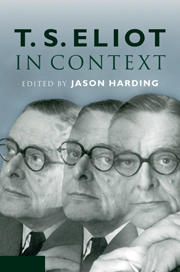Book contents
- Frontmatter
- Contents
- List of illustrations
- List of contributors
- Acknowledgements
- List of abbreviations
- Introduction
- PART ONE LIFE
- 1 St Louis
- 2 New England
- 3 Paris
- 4 London
- 5 Englishness
- 6 The idea of Europe
- PART TWO FORMS
- PART THREE LITERARY CROSS-CURRENTS
- PART FOUR POLITICS, SOCIETY AND CULTURE
- PART FIVE RECEPTION
- Further reading
- Index
6 - The idea of Europe
Published online by Cambridge University Press: 05 August 2012
- Frontmatter
- Contents
- List of illustrations
- List of contributors
- Acknowledgements
- List of abbreviations
- Introduction
- PART ONE LIFE
- 1 St Louis
- 2 New England
- 3 Paris
- 4 London
- 5 Englishness
- 6 The idea of Europe
- PART TWO FORMS
- PART THREE LITERARY CROSS-CURRENTS
- PART FOUR POLITICS, SOCIETY AND CULTURE
- PART FIVE RECEPTION
- Further reading
- Index
Summary
After the First World War, in which 16 million people died, and before the outbreak of the Second World War, in which even more would die, T. S. Eliot strove for a reconciliation of past divisions by emphasising ‘the idea of a common culture of Western Europe’. This idea of Europe as a cultural unity was promoted in the literary review Criterion, which he founded in 1922 and edited until its demise in New Year 1939. In fact, throughout the 1920s there existed an informal network of like-minded European periodicals, including the Criterion in Britain, La Nouvelle Revue Française in France, Europäische Revue, Neue Deutsche Beiträge and Die Neue Rundschau in Germany, and Revista de Occidente in Spain. Prominent European intellectuals such as Eliot, the Viennese poet and playwright Hugo von Hofmannsthal, the German novelist Thomas Mann, the German professor of literature Ernst Robert Curtius, the French philosopher Julien Benda and the Spanish philosopher José Ortega y Gasset contributed regular essays to these reviews. Although the views and opinions of these European intellectuals often diverged, they shared a common conception of the importance of the European cultural tradition. As a reviewer in the Criterion, discussing an essay by Mann published in Die Neue Rundschau, put it: ‘Intellectual differences may be the cement of international friendship, provided there is mutual respect and a common consciousness of a fundamental common tradition.’ Eliot referred to this common tradition as ‘classicism’: this chapter explores his changing perception of the European cultural heritage.
- Type
- Chapter
- Information
- T. S. Eliot in Context , pp. 52 - 60Publisher: Cambridge University PressPrint publication year: 2011
- 1
- Cited by



